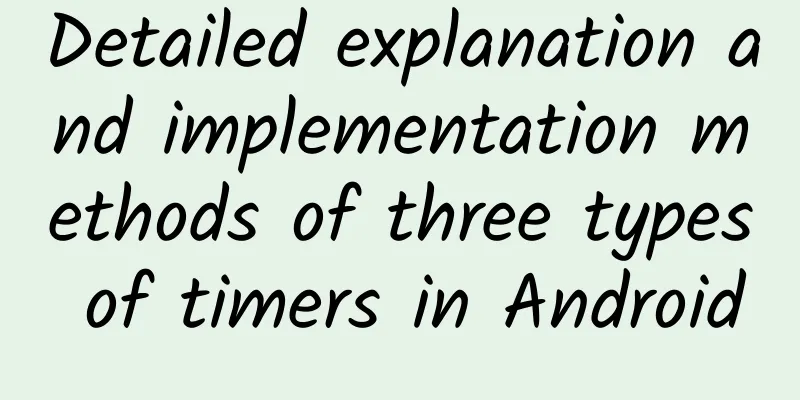Detailed explanation and implementation methods of three types of timers in Android

|
This article mainly introduces the knowledge of Android timer. Here are three methods to implement the timer. Friends in need can refer to it. Method 1: Handler+Thread
Method 2: postDelyed of the Handler class
Method 3: Handler+Timer+TimerTask
The above is the summary of the Android timer information. I will continue to add relevant knowledge in the future. Thank you for your support! |
<<: Tmall client's security model is the cornerstone of user experience
>>: Summary of Android memory leaks (with memory detection tools)
Recommend
Can't quit smoking? Going cold turkey actually works
This is the 4712th article of Da Yi Xiao Hu Cold ...
“Immune gap” VS “immune deficiency”: Who is more reasonable?
The theory that the new coronavirus destroys the ...
What is the difference between programmatic and custom creatives in Toutiao’s information flow?
With the launch of information flow, many friends...
iOS 9.2 released, 360 found 5 security vulnerabilities and was thanked
On December 9, Beijing time, Apple released the o...
Why don't many phones have a mute button?
"Why can't Android phones basically have...
QQ space marketing promotion, what products can be promoted by QQ space advertising?
QQ Space has 568 million active accounts, and mor...
From incoming call reminders to "PUBG cheats", what has mobile phone vibration experienced over the years?
In 1996, Motorola launched the flip phone Motorol...
Qingmu·WX group project·earn millions a year (updating) Resource acquisition
Qingmu, the founder of Weiqunhui, has been workin...
Big news! The top ten scientific advances in China in 2021 are announced
On February 28, the High Technology Research and ...
Here, you can see the whole Sichuan at once
In Ya'an You can see the whole Sichuan at onc...
How are the movies and videos on TikTok edited? Where can I find the materials for TikTok movie editing?
How are the movies and TV videos on Douyin edited...
When charging, should you plug in the phone or the charger first? These incorrect charging methods will damage your phone quickly
For many people in modern society, how much batte...
Why do I spend money on information flow promotion but get no conversion?
" Why do you give me hope but let me down ?&...
Farmed shrimps are raised with antibiotics and hormones. Is it really not recommended to eat them?
“Farmed shrimp cannot metabolize harmful substanc...
Exclusive "Douyin Live Streaming" DY Empowerment System Star
Course Contents: 1. Preparations for newcomers to...









